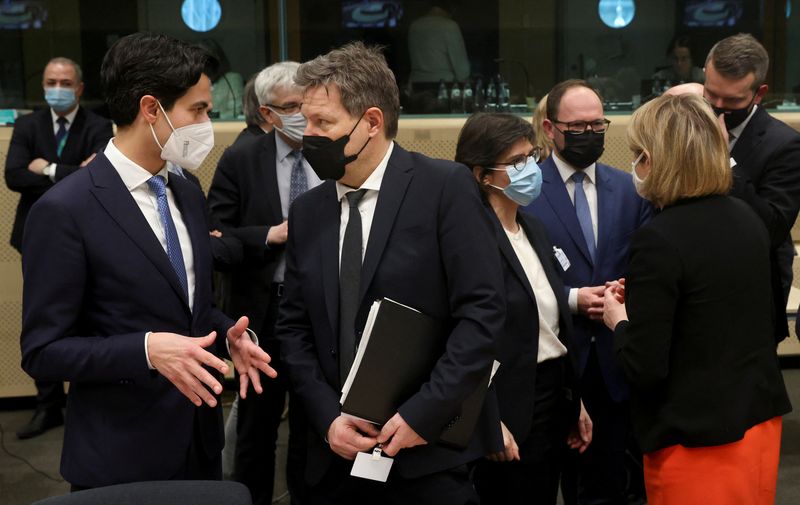By Kate Abnett
BRUSSELS (Reuters) -Energy ministers from European Union countries on Monday agreed to urgently link a European power system to Ukraine's grid, a move that would increase its independence from Russia following Moscow's invasion of the country.
The invasion of Ukraine by Russia, Europe's top gas supplier, has sharpened concerns of disruption to energy supplies and increased scrutiny of European Union countries' reliance on imported fossil fuels.
It has also raised concerns about Ukraine's own energy system, and EU ministers on Monday backed a long-planned link of Ukraine's electricity grid with Europe's.
"There was a broad agreement around the table. Based on this, we will move forward... to connect Ukraine's electricity system as quickly as possible," EU energy commissioner Kadri Simson said after the meeting.
Ukraine disconnected its grid from a Russian system last week and has asked for emergency synchronisation with a European system. That would mean Russia would no longer control technical aspects of Ukraine’s network such as grid frequency. EU officials said the link could be completed within weeks.
Simson said it was possible that Russia could take "retaliatory steps" affecting Europe's energy supplies in response to sanctions from the West, but that current gas storage levels and increased liquefied natural gas (LNG) deliveries could see Europe through this winter.
The Commission will next week propose a requirement for countries to fill gas storage to minimum levels ahead of winter, to bolster countries against supply and price shocks, according to a draft plan seen by Reuters.
The proposals will also include measures to expand renewable energy faster, as Brussels reemphasises the need to shift away from relying on imported fossil fuels -- not only to fight climate change, but as a matter of security.
To meet its 2030 climate target, the EU expects to reduce gas consumption more than 25% from 2015 levels, although gas is expected to retain a significant share of Europe's energy mix for at least the next decade.
"We have to work on developing low-carbon energy, renewables so we're no longer so dependent on gas," said France's ecological transition minister Barbara Pompili, who chaired the ministers' meeting.
Russia supplies around 40% of Europe's gas. EU rules require all member countries to have a plan to respond to gas supply shocks, which they have updated in recent weeks.
Analysts have said a complete or prolonged halt to Russian gas deliveries to Europe would have severe economic repercussions, requiring emergency measures such as factory closures.
Dutch front-month gas prices spiked by around 11% on Monday amid concerns about possible disruption to Russian flows. Gazprom (MCX:GAZP) said it was supplying gas via Ukraine in line with demand from European consumers.
EU ministers also discussed a proposal from Greece for a new EU fund to provide low-interest loans to help governments finance measures to tackle high energy prices.

Soaring gas prices in recent months have hiked bills for households and industries, prompting governments in most of the EU's 27 countries to offer subsidies and tax breaks.
"We must not underestimate the consequences of the Russian invasion on energy prices and energy security," Greece's energy minister Kostas Skrekas said.